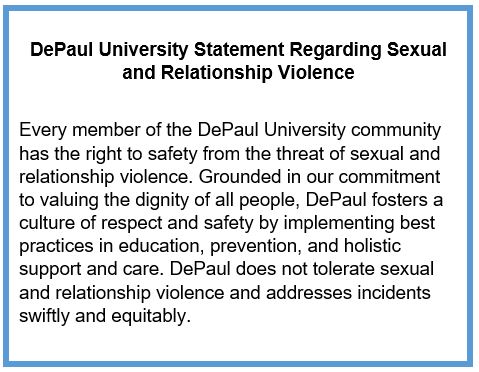to the state to share university policy and data related to reports of sexual violence, domestic violence, dating violence and stalking involving students.
The report, which covers the calendar year 2018, was submitted to the Illinois Attorney General’s Office and Illinois Department of Human Rights, as required under the Illinois Preventing Sexual Violence in Higher Education Act.
“DePaul takes a collaborative approach to preventing and responding to sexual and relationship violence,” says Eugene Zdziarski, vice president of Student Affairs. “The university’s report to the state is a snapshot of those efforts—from policies and preventive programming to the range of options available to survivors in making a report.”
The state report, which is posted on the
Title IX website, also contains data on complaints about sexual violence, domestic violence or dating violence and stalking involving students reported to DePaul’s Title IX office, regardless of where the incident occurred. This differs from data the university collects under the Clery Act that counts incidents of crimes that occur in specific locations mandated by federal law, mostly on campus or in the immediate surrounding area, but not most off-campus incidents.

DePaul’s Preventing Sexual Violence in Higher Education Act Annual Report details the range of responses that the university makes available to a survivor. On-campus and off-campus resources and a description of the range of options are available every time someone reports sexual violence. Survivors also can request a range of assistance, including a change in on-campus residence, a connection to counseling or an academic adjustment, such as administrative withdrawal, extension of time on an assignment or exam, or an alternate assignment. Other responses also could include assistance with reporting to local law enforcement, investigation, and review through the Student Conduct Process or other university policies and procedures.
The Office of Gender Equity, Dean of Students Office, Office of Health Promotion and Wellness and other offices across the university work together to prevent and respond to sexual and relationship violence. The
director of Gender Equity, who serves the university’s Title IX coordinator, monitors and oversees overall campus-wide implementation of Title IX including training, education, communications and administration of complaint procedures for faculty, staff, students and third parties. The dean of students, who is a deputy Title IX coordinator, oversees the Student Conduct Process.
Health Promotion and Wellness offers confidential support and resources to survivors and promotes year-round prevention programming. All Title IX coordinators are listed on DePaul’s
Title IX website.
Health Promotion and Wellness leads many programs to support survivors and provide education around sexual violence, dating violence, domestic violence, stalking, consent, healthy relationships and bystander intervention. Support and education are provided to the entire DePaul community: students, staff and faculty. These offices partner with other university stakeholders on a variety of programming and training.
Ongoing programs include Vinny Vow, a bystander intervention workshop, and One Love’s Escalation workshop, which focuses on relationship violence. HPW also delivers presentations on sexual and relationship violence prevention and response by request to campus partners and student groups and plans programming for Sexual Assault Awareness Month in April, including Take Back the Night.